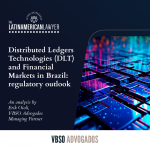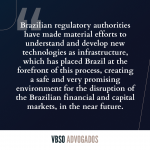
19 Dec Distributed Ledgers Technologies (DLT) and Financial Markets in Brazil: Regulatory Outlook
About the author:
Erik Oioli
JD in Commercial Law, Oioli is the Managing Partner of VBSO Advogados, head of the Bank Law and Capital Market practice and partner of the firm’s Corporate Law and M&A practices. Oioli is acclaimed as one of the leading experts in crypto assets, blockchain and tokenization in Brazil, with a background of over 25 years in financial and capital market deals.
This article is part of the 2024 Doing Business in Brazil Guide. Check the full report here.
–
Substantial progress has been made in the use of Distributed Ledger Technologies (DLT) and of crypto assets in general, in recent years, which inherently allows for great potential for disruption in the Brazilian financial and capital markets. This translates into and is also supported by material regulatory efforts made by legislators and regulatory authorities, such as the Central Bank of Brazil (BCB) and the Brazilian Securities and Exchange Commission (CVM).
The urgent demand for regulation is justified by the need to offer greater legal certainty to all parties that use these technologies and in the negotiation of emerging assets. Brazil’s legislative houses have passed several Bills in response to this urgency, especially Bill 4,401/2021, which gave rise to Law 14,478/2022. Said law sets forth the terms on the regulation of virtual asset service providers. In addition to the new law, the Central Bank of Brazil has created and issued digital currency DREX, and CVM has recently issued opinions on the tokenization of receivables.
Law 14,478/22 came into effect in June 2023 and sets out the rules to be followed in the provision of virtual asset services. The law also regulates the providers of said services, and defines the list of activities that fall under the Virtual Assets Service Providers (VASP): the exchange between virtual assets and national or foreign currency, the transfer, custody or management of said assets or of instruments that allow control over them, in addition to participating in financial services and providing services related to an offer by an issuer, or in the sale of assets.
BCB has authority to supervise and set out the terms for the operation of said service providers, as determined under Article 1 of Decree 11,563 of 2023. BCB is liable for authorizing the operation of VASPs, stipulating the requirements to be met on the appointment to management positions, on the supervision of said providers, and on establishing governance, operational and compliance rules, including anti-money laundering crimes and anti-terrorism rules, in addition to other matters. As of now, the rules that will govern Law 14,478/22 are pending availability for public consultation.
BCB not only has authority to regulate and supervise the VASPs, but also, in the meantime, has developed the Real Digital project (the Brazilian CBDC), generally known as DREX. DREX design first started under BCB Ordinance No. 108,092/2020, which set up an advisory Task Force that gave rise to a Permanent Forum for discussions on the matter. The efforts made resulted in the issue of the rules and DREX, as well as on the organization of a special edition of the Lift Challenge Real Digital. The special edition of this lab included focusing on new business models that would benefit from smart payments using technological innovations such as smart contracts and Internet of Things (IoT), among other initiatives.
In short, DREX covers three applications: wholesale payment, instant (or real-time) payments and, above all, the promotion of new business models. The three are feasible thanks to the use of blockchain technology, which offers transparency, speed, privacy, security and good cost-effectiveness to transactions, in addition to enabling the construction of self-executing contracts (smart contracts) and, consequently, the development of these new business models. The project is currently in the test phase and rollout is scheduled for 2024.
The importance of DREX lies not only in the creation of a sovereign digital currency, but above all in the development of a blockchain infrastructure where several financial transactions will be carried out. There is a clear transition towards a truly tokenized economy, where assets are born and circulate digitally.
All these efforts are expected to create momentum for the issuance of digital assets in the capital market. CVM has issued several opinions and official notices to the market, in recent years, clarifying its understanding on crypto assets. In 2017, CVM set out the rules for Initial Coin Offerings, to raise funds for investors through cryptocurrencies. In 2020, CVM designed Regulatory Sandbox 21, allowing for the assessment and analysis of business risks related to crypto assets and blockchain. In turn, in 2018, CVM published Official Notice No. 1/2018/CVM/SIN recommending the acquisition of crypto assets, by investment funds, via exchanges.
In 2022, CVM issued Opinion No. 40/2022, which determined the obligation for any securities-based crypto asset offerings to be traded according to CVM rules, both for primary or secondary offerings. In this context, depending on how the deal is structured, tokens may be defined as securities and, consequently, must be submitted to CVM regulation. Finally, in addition to Opinion 40/2022, CVM issued Resolution 175 in December 23, 2022, which comes into force in October 2023, authorizing Financial Investment Funds to invest in crypto assets, provided they are traded by CVM or BCB-approved entities; prior to the Resolution, only indirect investments in these assets were authorized.
CVM’s most recent understanding on crypto assets was issued under Official Notice No. 6/2023/CVM/SSE, in which CVM set out certain requirements to classify receivables or fixed income tokens as securities, pursuant to Law 6,385 and the recently approved Securitization Law (Law 14,430). Current capital market laws still pose challenges on the registration of public offers of tokens as securities. However, while definitive rules on the matter are still pending, CVM has found a way for such offers to be made via crowdfunding platforms.
In view of the foregoing scenario, it is arguable that Brazilian regulatory authorities have made material efforts to understand and develop new technologies as infrastructure, which has placed Brazil at the forefront of this process, creating a safe and very promising environment for the disruption of the Brazilian financial and capital markets, in the near future.




